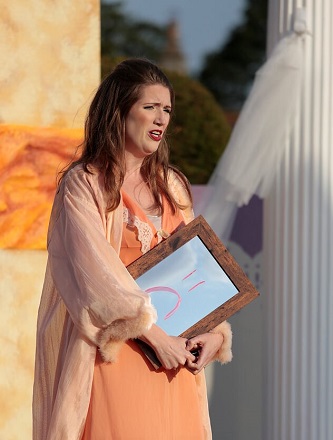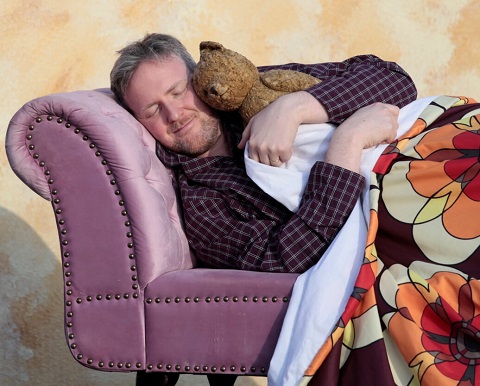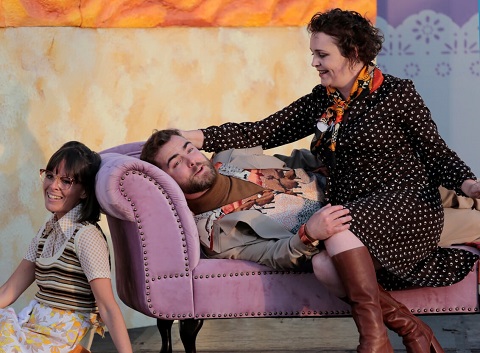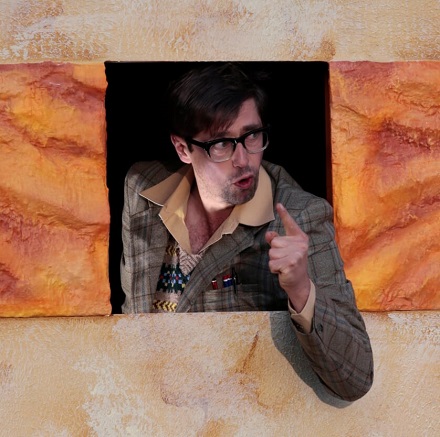18 Sep 2019
Bampton Classical Opera: Bride & Gloom at St John's Smith Square
Last week the Office of National Statistics published figures showing that in the UK the number of women getting married has fallen below 50%.

Last week the Office of National Statistics published figures showing that in the UK the number of women getting married has fallen below 50%.
That’s perhaps not surprising, if Stephen Storace’s comic opera Gli sposi malcontenti (The Discontented Newly-Weds) is evidence of what might await those who take the nuptial plunge: loneliness and longing, desolation and distress, if Storace’s librettist, Gaetano Bertati, is to be believed!
But, as always, Bampton Classical Opera’s Artistic Director, Jeremy Gray, has found witty ways to make Bertati’s characters’ misery the source of our own merriment in the company’s Summer 2019 production of Storace’s opera buffa, which arrived at St John’s Smith Square after performances at Bampton and Westonbirt. And, while the premiere performance of Gli sposi malcontenti resembled a wedding-day disaster - with Nancy Storace collapsing mid-aria in Act 1, bringing proceedings to a halt - there was no danger of such catastrophe at St John’s where the consistently accomplished cast of seven presented Bride & Gloom in Brian Trowell’s English translation, with charm, bonhomie and uniformly terrific diction. CHROMA provided light and lilting instrumental support, conducted by Anthony Kraus.
 Jenny Stafford (Eginia).
Jenny Stafford (Eginia).
Gaetano Brunati’s libretto serves up the anticipated buffa recipe: a suspicious husband, a domineering father, a boorish boffin hell-bent on revenge, a pair of thwarted, scheming beloveds, and a wily maidservant. (See here for detailed synopsis and historical background.)
After their tantrums and tiffs as the self-centred sisters in Bampton’s 2018 production of Isouard’s Cinderella, Jenny Stafford and Aoife O’Sullivan returned here as the stepsister rivals for Artidoro’s love, demonstrating equal grace and style in shaping Storace’s tuneful melodies. As the emotionally conflicted Eginia, Stafford’s soul-searching was delivered with focus and gravity. Her opening cavatina - think the unhappy, abandoned Countess of ‘Porgi amor’ - was poised and affecting, and Stafford established a particularly convincing musico-dramatic stature before the concluding nocturnal disguises and denouements. O’Sullivan’s sporty, spirited Enrichetta was as adept at keeping a tennis ball aloft mid-aria as negotiating the vocal challenges, singing, as always, with unwavering security, and a well-centred and appealing tone.
 Gavan Ring (Casimiro).
Gavan Ring (Casimiro).
Gavan Ring’s vocal strength and character belied Casimiro’s blandness. Ejected from his marital bed, as he nestled under a blanket on the chaise longue Casimiro may have looked content with just a shabby teddy-bear for company. But, a superb performance from Ring drew forth a rich range of developing emotions and as Ring swelled sonorously to the tenorial high-points of Casimiro’s avowal of lingering love for Eginia, we understood that beneath the Barbour and flat cap was a burning, ardent heart. No wonder that Eginia eventually comes to appreciate his hidden merits and attractions.
Arthur Bruce’s relaxed baritone conveyed Artidoro’s easy charm and confidence, cockily tossing and bouncing a tennis ball, suavely anticipating the success of his elopement scheme. When, discovered by the suspicious Rosmondo hiding under a blanket in the chair, this Artidoro did not panic when threatened by the collapse of his strategy or the bullying jabs from Casimiro, whipping out a water-pistol with the panache and poise of Indiana Jones.
 Caroline Kennedy (Bettina), Arthur Bruce (Artidoro), Aoife O'Sullivan (Enrichetta).
Caroline Kennedy (Bettina), Arthur Bruce (Artidoro), Aoife O'Sullivan (Enrichetta).
Rosmondo’s patriarchal pontificating was delivered with firmness and strength by baritone Robert Davies, who achieved the difficult task of being sufficiently mean to inject credible tension but not so menacing as to preclude compromise and reconciliation. Like Adam Tunnicliffe as Valente, Davies demonstrated a good instinct for physical comedy, both singers falling over and into the chaise longue, and the wedding-cake walls, with neat timing and without undue mishap.
Despite seeming almost to strangle himself with his academic hood, Tunnicliffe’s Valente blustered and raged with bite and colour, out-tricked by Caroline Kennedy’s vivacious Bettina - a put-upon but opportunist maid who was ever on the look-out for a swig from one of her employer’s wine bottles or a smoke from Artidoro’s joint. Tunnicliffe’s dark grain was a lovely complement for Kennedy’s light, graceful soprano, especially in their final duet in which Bettina dupes the disagreeable don into believing that she will collude in his conspiracies.
 Adam Tunnicliffe (Valente).
Adam Tunnicliffe (Valente).
Storace evidently had a fine ear for a silky cavatina, a sure sense of how to shape an ensemble-finale, and the ability to create moments of heart-warming sincerity. His arias may lack a little variety of invention and tempo, but if he doesn’t equal Mozart for musical wit and dramatic sparkle then one imagines that the latter, into whose orbit Nancy’s success drew Stephen, was not entirely unconscious of Gli sposi malcontenti’s comic episodes - a romantic interloper discovered hiding in a chair, a climactic nocturnal escapade in a garden - when he penned Figaro the following year.
Gray’s simple, witty design essentially sets the action - given a Seventies feel by the prevailing harvest-gold and burnt-orange palette - inside a wedding cake, with the proceedings overseen by outsized Ken and Barbie look-a-likes in their nuptial finery perched atop a gigantic slice of frosted sponge. The busy ensembles were deftly handled, the confusions and conflicts which end Act 1 exploding in a storm of smoke, buttercream and confetti: the icing on the cake of an evening which ended, naturally, with sweet forgiveness and harmony.
Claire Seymour
Stephen Storace: Bride & Gloom
Eginia - Jenny Stafford, Casimiro - Gavan Ring, Enrichetta - Aoife O'Sullivan, Artidoro - Arthur Bruce, Rosmondo - Robert Davies, Valente - Adam Tunnicliffe, Bettina - Caroline Kennedy; Director/Designer - Jeremy Gray, Conductor - Anthony Kraus, Associate director - Alicia Frost.
St John’s Smith Square, London; Tuesday 17th September 2019.